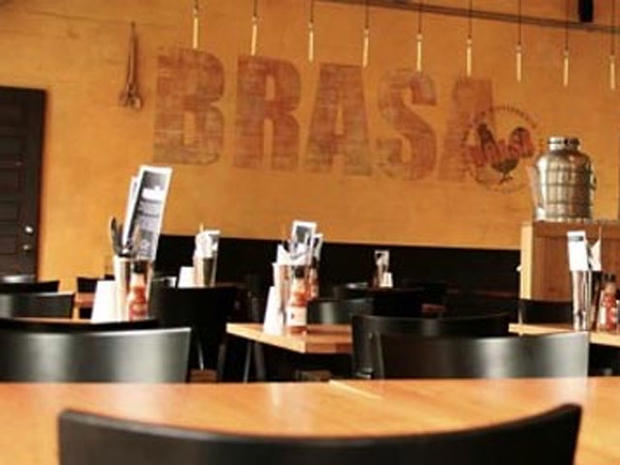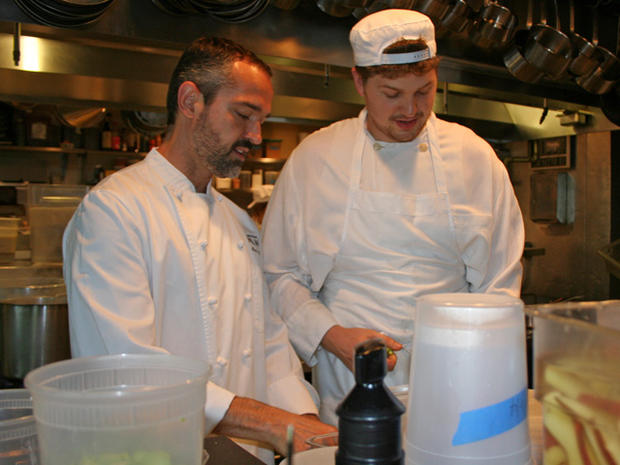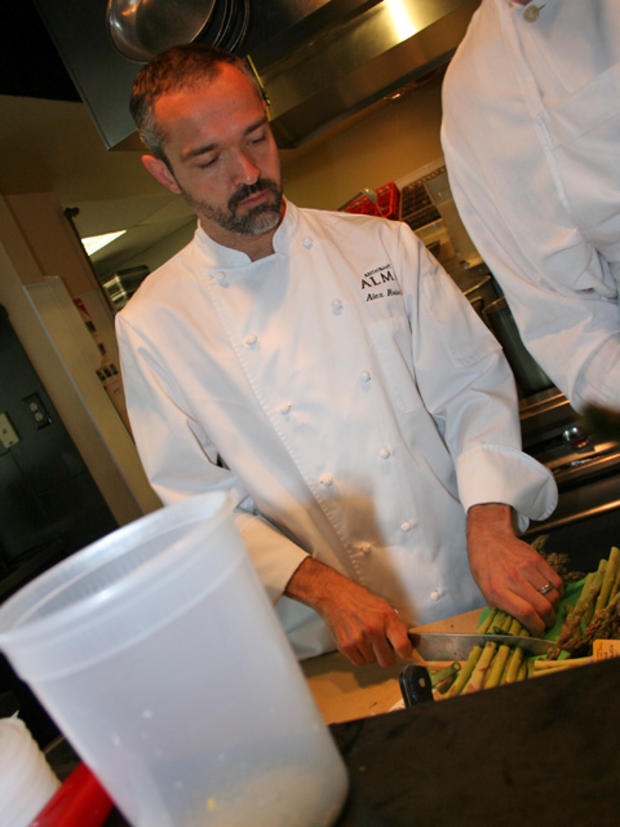Curiocity: A Chef's Profile Of Alex Roberts, Part 2
The Twin Cities are blessed when it comes to talent in the kitchen. The culinary minds at the helm of our favorite restaurants receive critical acclaim and top honors from food enthusiasts and reviewers, alike. But who are the people behind the chef's coat? Our Chef's Profile aims to find out.
Alex Roberts may be a highly accomplished chef with a James Beard Award under his belt and several successful restaurants, but his grace and humility when it comes to leaving a mark on the culinary world is what propels him into true greatness.
If you've ever eaten at one of his fine establishments, Restaurant Alma or Brasa, you know that locally sourced and sustainable ingredients are at the centerpiece of his creations. But for chef Roberts, it goes beyond a conscious effort to his grocery shopping -- he's working to expand the definition of sustainable to go beyond food and into his business model, and with any luck, into the way his customers look at spending an evening out.
As we learned last week, Roberts was a bit of a late comer when it came to his food destiny. He didn't grow up thinking he'd be a chef someday and even when his restaurant bosses brought it up to him, he wasn't totally convinced. Still, once he made the leap into culinary school, it was apparent this was what he was meant to do.
From working with the giants of the industry to opening his first restaurant in his hometown, Roberts said he's grateful for every experience he's had along the way and the never-ending opportunity to learn and grow his craft.
In Part 2 of our chef chat, Roberts shares a glimpse inside his home kitchen, explains the potential problem with reality cooking shows and though an avid CrossFit trainer, he clues us in on his one guilty pleasure.
-------
You've said you were inspired to open Brasa after spending some time traveling but weren't quite ready to open it when the inspiration hit you. What changed when you finally opened it in 2007?
I knew I wanted to create an inclusive restaurant that was affordable for a lot of people. The price point at Alma moved up over the years as we committed to a multi course menu format and decided to feature the best ingredients we could find. I was fine with that because Alma was a special occasion restaurant for most people. Brasa had to be a little different because it was more of an everyday food concept. One thing that I couldn't wrap my mind around was having a place with an appetizer, entree and dessert format but also a low check average. We needed to find a way to have shorter meal times and efficiency in the kitchen.
Finally, I decided it should just be an eating place, kind of like an old school diner. You go and eat your one plate and maybe have dessert. Kind of like how people go get hamburgers. You get your hamburger and you go. That was kind of the breakthrough. Still, there was the question of concept. I had a hard time thinking I could succeed selling rice and beans, collard greens and plantains as a white guy from Minnesota. I was concerned people might be offended or think I was saying, "here's something traditional." The breakthrough there was the chicken concept, because no one owns chicken. Chicken's just chicken. But if I could do this kind of chicken-oriented concept, and then just cook all the side dishes and not claim them to be any cultural example. Just say, "It's yellow rice and black beans. It's collard greens with smoked chicken." Let people decide if the food speaks to them or not. It's been amazing how people have accepted Brasa. We have very diverse clientele. That part of it is successful beyond my wildest imagination … Just how people embraced it ... Rich folks and working class folks and not just Americans but people with English as a second language.
You have two locations for Brasa, which always seem to be busy. It's the type of restaurant that seems like it could easily become a chain. Any plans to open anymore?
Business is good. You know, I've thought about it because people bring it up so much. I mean really, every time people bring up Brasa their first question is nearly always, "When's the next one opening?" I designed it with the idea that expansion was possible but think we have no business becoming a chain because we are still figuring things out and improving. Slow expansion is more likely. I've learned a huge amount from the concept because my experience was primarily in fine dining beforehand. I was used to making one plate for one customer. Brasa is primarily batch cooking, a very different system. The family-style format we feature grew from the challenges of every customer building their own individual plate in the early days. The family-style serving simplifies the expediting process. I'm going on a bit here but there are a number of issues making expansion complex. One, Brasa requires everything to be cooked from scratch. Cooking concepts aren't the most franchise-friendly concepts because they require skill. Two, staffing is an issue. At Alma, we have a constantly changing seasonal menu that draws in creative people and people that thrive on change. Brasa is built on less change so it can get repetitive after a time and create boredom for some. Boredom can be a real enemy of quality and consistency so it's tricky … you can tell I'm wrestling with the ideas. A chain concept would most likely have to be some simplification of the current Brasa. I have no plans to take it national but I do have an idea of trying out a smaller, satellite concept of Brasa here in town just to see how it would do. It'd be a fun thing to try out. Right now, I have young kids – 7, 6 and 3 – and I like being here with them. I like being here with my staff. A lot of people love to open new things but I enjoy more the flow of things running well. We'll see. There is no question the country could use more affordable, whole food concepts out there.
Speaking of your kids, what do you like to cook a lot at home?
Our home cooking is a lot like Brasa food. Simple things served separately. My wife and I both cook. Most of the Brasa menu was created while I was cooking at home ... Most of the recipes were in my memory and had to be converted to paper to pass on and teach. Things I learned from friends and travel; things that were inspired by recipes from Puerto Rico, Dominican Republic, Mexico and New Orleans. Our home cooking is all about fresh food. A meal might be scrambled eggs, corn tortillas and sautéed spinach for breakfast with a fruit smoothie or homemade chicken soup, rice and steamed broccoli with lots of butter for dinner. Really, the same principles I stick to in my restaurants. We make one meal that we all share. I don't like the idea of serving a separate meal for children. Our little girl's the carnivore, the middle guy is the fruit/vegetable guy and then the oldest one is the starch guy, give him a pile of rice and he's happy. They all eat a bit of everything anything but have their favorites.
What is your biggest guilty pleasure food?
Crunchy stuff. The only thing I really stay away from is fast food restaurants. I just don't really like them. I wasn't raised on it. I had a stage when I had my own paper route. I was probably about 13 and I bought every possible kind of fast food and candy you could imagine. I had my own money for the first time. I tried everything. There was a period when I kind of liked some junk food but it's amazing when you're raised on really good food, you just really don't crave that stuff much. You just don't. When we go on a road trip, my kids want to get chips. We don't usually have chips around the house but they'll get Cheetos or something like that. So I'll be like, 'OK, gimme some.' I make popcorn at home with lots of butter. I like ice cream. I'm not a big sweet tooth, though. Not a big pizza fan. If there is a bag of chips around, I'll be eating some.
Beyond being in a kitchen, what's your favorite pastime?
My favorite pastime is probably reading for pleasure. I'm really bad about making the time to do it in the day so I usually fall asleep trying to read at night. My favorite time away work aside from being with my family has been pursing fitness after about 10+ years of doing nearly nothing active besides being on my feet all day. I did some team sports as a kid, then martial arts as a teen and young adult. I've always been really interested in movement. The last couple of years I've been doing something called CrossFit, which I love. I basically do that three to four days a week. It's a remarkable fitness program that provides an environment to challenge you and measure the results. I like that. It's a wonderful experience for me. It's also just given me a feeling of vibrancy and greater energy for a demanding career. I feel better at 40 than I did at 30.
What do you think about reality cooking shows and the way chefs are perceived today?
I think it's very entertaining. I think it's some of the best entertainment out there on TV. It really is. There is some substance to it. A lot of reality shows are about what people eating for breakfast or something and I'm not sure that anybody really cares. But you know, we're interesting as human beings because for some reason we do care what other people are doing. Cooking shows have a lot of content if you care about food, plus all that drama of people being together. Very entertaining. I have watched some of it. I've watched 'Top Chef' seasons in the past. There's a lot more on now than before. With YouTube and everything else, there's just an endless amount of it. I just don't watch that much. I actually would like to watch more because there is a lot of content in some of those shows.
The only complication I see is that it has the potential to create odd expectations for young cooks. It doesn't necessarily emphasize paying your dues and working your way up the ladder. That's the story of the most successful chefs. You have people coming from culinary school and coming to kitchens like this where there's a thousand things going on every day -- little details around them that they can be learning from -- and of course, they're doing something like cleaning shrimp or cleaning greens, basic tasks to support the kitchen, and they're bored out of their minds. And I'm thinking, like, 'Wow, they're so interested in kind of the end part of being what a chef is and the Chef job but they don't realize how much pleasure in learning there is with all the basic tasks and how fun it is to get to the end result.' So I guess in my long-winded answer, I think in some ways, they're great entertainment and in some ways, some of them can create unrealistic expectations for certain people. But I do like the fact that these shows, overall, are making the lives of chefs more public. People are coming out of high school saying they want to be a chef when they grow up. That's not what I saw at all when I was in high school.
Would you ever audition for "Top Chef" or "Chopped" or something like that?
I think 'Top Chef' does an open casting call and a private casting call. We got called for the private one but I think it was right after the Beard Awards. I thought, you know, anybody can have a bad day on those shows and I don't want to be the guy that's won the Beard Award and then goes home the second week. I think I could have a great day or I could have a bad day and go home. It could be a difficult thing. I decided I wasn't interested in that. Also, I think the story's more interesting when you have a young chef reaching for something, getting established. So right now, no, it's not a goal. To me it's more of a distraction. To be away from here, be away from family and away from the flow of the restaurants, plus I don't like to see myself on camera.
What's one ingredient you'd prefer never to work with?
I really dislike frozen sea urchin. I like usually like fresh sea urchin and some people can't tell the difference but for me, there's something about it. I just don't like it. Kidneys and brains, I'm not a big fan of either. I have no intention of cooking it. Some people love it, I know.
What about an ingredient that you're drawn to?
It's funny, I'm drawn to fish but I almost never cook fish at home. I'd say probably greens. They're always on my menu, in as many combinations as possible. Spinach chard, escarole, spinach ... we might have five different greens on the menu at Alma right now. Greens are something that's always on our home menu, too. Obviously, Brasa has two or three every day. Greens, I just can't get enough of. I like to sauté them with a little oil and garlic or braise them with meat and get the flavor of meat in there. I think it's the way they interact with different flavors.
If you had to choose a "last meal," what would it be?
I know for sure it would involve rice. It wouldn't be a single thing. It'd probably be like a huge Brasa plate. It'd definitely be rice, some kind of slow-roasted meat like pork or lamb, there would be an egg of some kind, probably some greens, maybe some beans, probably one of those things where all the flavors run together. But now that I'm thinking about it ... maybe a steak and wild mushrooms. It's a tough hard question for a chef.
What are some of your favorite places to dine in the Twin Cities?
Yeah, over the years I've enjoyed going back to Bar La Grassa to see Isaac Becker and Nancy St. Pierre. Unfortunately, he always comps the bill so I get mad at him. I would probably go more often if he let me pay. La Grassa is good for sharing and I always enjoy it. The service is always great there. Mirror of Korea in St. Paul I've been going to for years. I've just been going there for so long that it's a place we tend to go back to. And the kids will eat it. ... It's funny, they like Korean food and they don't mind the smell of fermented vegetables, but they cannot stand the smell of fish sauce in Thai food. They can't handle that. Al's Breakfast, we love for breakfast. We don't go out that much. And when we go out, I try to go to new places. I always have a list of places I want to go to. There are places I'd like to go back to more often, like Piccolo. They're always changing the menus; there are always new things. I haven't been to Corner Table since it changed owners, so I'd like to get back there.
What do you hope to be known for in the culinary world?
It's a great question. My goal is to create a new model of restaurant success. A restaurant reaching for a broader definition of sustainability -- not just in terms of environment and food sourcing ... That's very important but also what it means in terms of value, leadership, integrity and job quality. I ask myself things like, are these jobs that support a quality of life to those that work here? Are customers coming back and experiencing value whether they're spending $100 at Alma for a four-course meal with a great bottle of wine or whether they're going to Brasa on their lunch break and spending $11? I'd like to be known as person that is contributing in a number of ways to the profession. That would feel like success to me.
Check out Part 1 of our chef chat with Alex Roberts. For more information on his restaurants, click on the following links: Brasa | Restaurant Alma.






